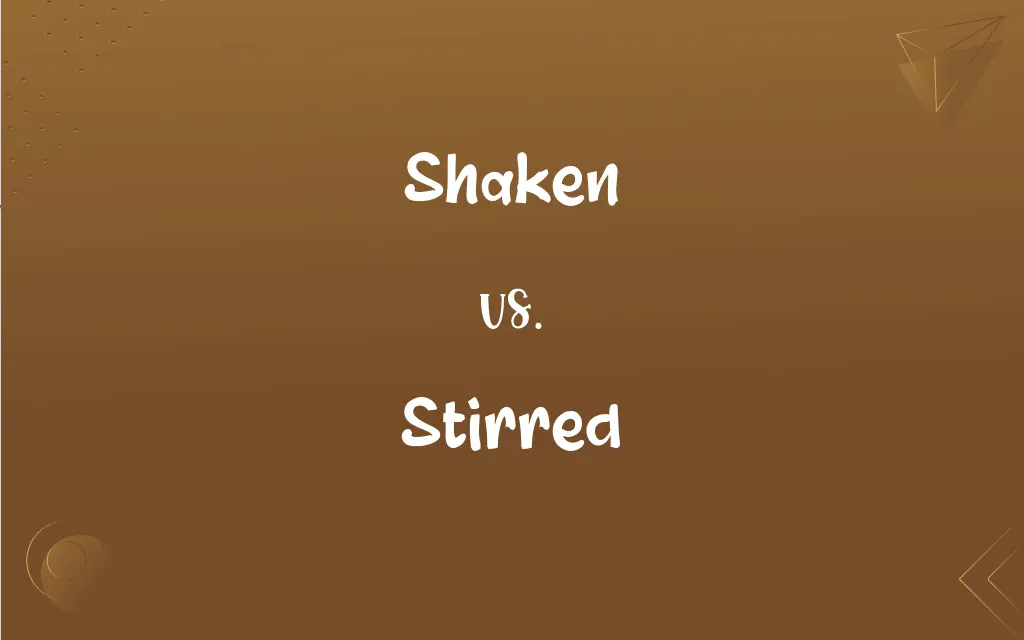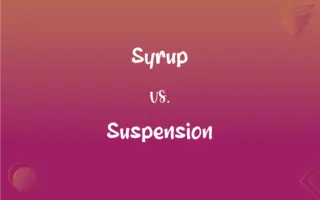Shaken vs. Stirred: What's the Difference?
Edited by Janet White || By Harlon Moss || Published on December 24, 2023
Shaken involves vigorous motion causing ingredients to mix and chill quickly, often adding air and dilution; stirred gently combines ingredients, preserving texture and clarity.

Key Differences
"Shaken" implies a brisk, vigorous motion, often used in cocktail making to combine diverse ingredients rapidly, introducing air and enhancing flavor fusion. This method typically results in a slightly diluted and well-chilled mixture. On the other hand, "stirred" is a more gentle technique, ideal for cocktails with clear spirits. It combines ingredients smoothly without introducing air, preserving the clarity and subtle flavors of the drink.
In culinary contexts, "shaken" can refer to the action of mixing ingredients in a closed container, creating a homogenous mixture, often used for dressings or marinades. This method can also aerate the mixture, altering its texture. Conversely, "stirred" denotes a more delicate approach, usually applied to mix ingredients in a pot or bowl, ideal for maintaining the texture of delicate components, like in risottos or custards.
In literature and everyday language, "shaken" often conveys a sense of being emotionally or physically disturbed or agitated, as in being deeply affected by an event. "Stirred," however, usually refers to a gentle awakening or slight movement of emotions or thoughts, suggesting a subtle but meaningful impact.
Regarding physical sensations, "shaken" can describe the feeling after a jarring experience, like an earthquake or a shock, implying a more intense and disorienting effect. In contrast, "stirred" might be used to describe a gentle nudge or awakening, such as being stirred from sleep by a soft sound, indicating a milder, more controlled experience.
Comparison Chart
Cocktail Preparation
Rapidly mixes ingredients, adds air, dilutes more.
Gently combines ingredients, maintains clarity.
ADVERTISEMENT
Culinary Use
Mixes ingredients in a closed container, aerates.
Mixes gently, maintains texture in dishes.
Emotional Impact
Implies a strong, often disturbing effect.
Suggests a gentle, subtle emotional change.
Physical Sensation
Describes a jarring, disorienting experience.
Indicates a gentle, controlled awakening.
Literary Usage
Often conveys deep disturbance or agitation.
Refers to a slight, meaningful emotional stir.
Shaken and Stirred Definitions
Shaken
Emotionally upset or unnerved.
The news of the tragedy left the community shaken.
ADVERTISEMENT
Stirred
Moved slightly or gently.
The breeze stirred the curtains in the quiet room.
Shaken
Physically jolted or disturbed.
The earthquake left the building shaken but still standing.
Stirred
Mixed slowly and evenly.
She stirred the soup to prevent it from sticking to the pot.
Shaken
Disturbed or agitated by a strong impact or emotion.
After the accident, she was visibly shaken and couldn't speak.
Stirred
Provoked a subtle but real change.
The novel stirred controversy with its bold themes.
Shaken
Mixed or agitated by motion.
The bartender shaken the cocktail to perfection.
Stirred
Caused a slight but noticeable emotional or mental reaction.
The speech stirred a sense of hope in the audience.
Shaken
Subjected to rapid, vigorous motion.
He shaken the bottle vigorously before opening it.
Stirred
Awakened or activated from a state of rest or inactivity.
The alarm stirred him from a deep sleep.
Shaken
Past participle of shake.
Stirred
To pass an implement through (a liquid, for example), usually in circular motions, so as to mix or cool the contents
Stirred the soup before tasting it.
Shaken
Past participle of shake
Shaken
In a state of shock or trauma.
We were left shaken by the revelations of abuse.
Shaken
A flat shuriken resembling a spiked wheel, as opposed to the longer stick-like kind.
Shaken
Caused to shake; agitated; as, a shaken bough.
Shaken
Impaired, as by a shock.
Shaken
Disturbed psychologically as if by a physical jolt or shock;
Retrieved his named from her jolted memory
The accident left her badly shaken
FAQs
What's the purpose of stirring in cooking?
Stirring in cooking is to evenly mix ingredients and prevent sticking or burning.
Can "shaken" describe an emotional state?
Yes, it can describe being emotionally disturbed or agitated.
What does "shaken" mean in a cocktail context?
Shaken refers to vigorously mixing cocktail ingredients in a shaker.
Is a stirred drink less diluted than a shaken one?
Yes, stirred drinks are generally less diluted than shaken ones.
What does "stirred" signify in literature?
In literature, it often signifies a subtle emotional or thought change.
Can "shaken" refer to a physical sensation?
Yes, like feeling shaken after a rough ride.
What types of cocktails are typically shaken?
Cocktails with juices, syrups, or dairy are typically shaken.
Can "shaken" be used metaphorically?
Yes, it's often used metaphorically to describe being deeply affected.
Is stirring essential in cocktail making?
Yes, for certain cocktails, stirring is essential for a smooth texture.
Is being "shaken" always negative?
Not always, but it often connotes a strong, unsettling impact.
Does "stirred" imply a physical movement?
Yes, it can imply a slight physical movement or awakening.
When is stirring a better method than shaking?
Stirring is better for cocktails where clarity and smoothness are desired.
Can "stirred" refer to causing controversy?
Yes, it can mean provoking thought or controversy.
Can "shaken" be used in a positive context?
Rarely, but it can imply a positive, life-changing impact.
How does shaking affect a cocktail's texture?
Shaking can aerate the cocktail, making it frothier.
What does "stirred" mean in the context of feelings?
It means causing a slight but noticeable emotional response.
Is shaking faster than stirring in mixology?
Yes, shaking is a quicker way to mix and chill drinks.
Does shaking a cocktail always include ice?
Typically, yes, to chill and dilute the drink.
What does "gently stirred" imply in cooking?
It implies slowly mixing to blend flavors without harsh movement.
Is "stirred" ever used in a physical context?
Yes, like being stirred from sleep by a noise.
About Author
Written by
Harlon MossHarlon is a seasoned quality moderator and accomplished content writer for Difference Wiki. An alumnus of the prestigious University of California, he earned his degree in Computer Science. Leveraging his academic background, Harlon brings a meticulous and informed perspective to his work, ensuring content accuracy and excellence.
Edited by
Janet WhiteJanet White has been an esteemed writer and blogger for Difference Wiki. Holding a Master's degree in Science and Medical Journalism from the prestigious Boston University, she has consistently demonstrated her expertise and passion for her field. When she's not immersed in her work, Janet relishes her time exercising, delving into a good book, and cherishing moments with friends and family.






































































